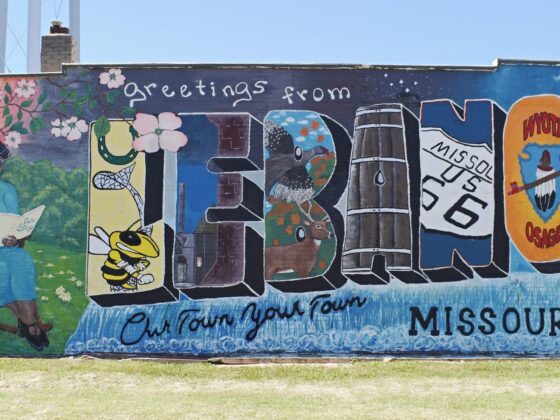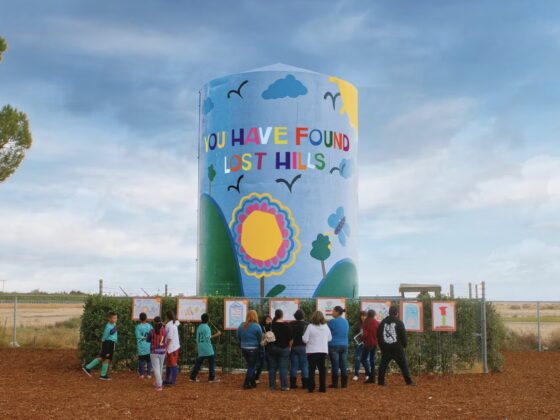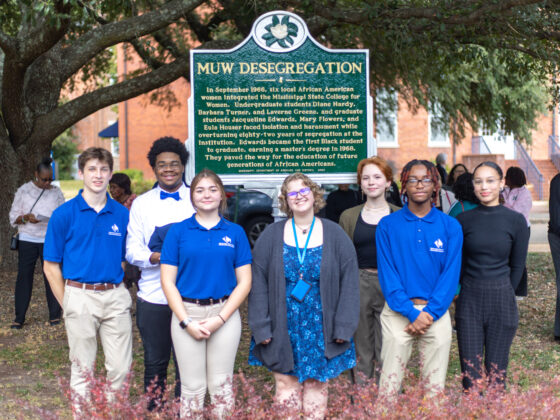Recently we reported on the small town of Lost Hills, in California’s agriculturally rich, economically challenged Central Valley. The story of Lost Hills was of how the company that is the main employer in the area, and its founders, decided that its responsibilities extended beyond merely providing paychecks. So it has worked with residents toward community welfare in the broadest sense, including health, education, recreation, housing, physical safety, and other ingredients of “the American dream” for families trying to build a better future.
This installment on the Central Valley involves a closer look at the educational part of this philanthropic commitment to community: the “Wonderful College Prep Academies” supported by The Wonderful Company in the Central Valley.
The Wonderful Company, a powerhouse agricultural producer and employer in California’s Central Valley, founded and continues to support two public charter schools in the region. The Wonderful College Prep Academies (WCPA) opened first in Delano (pronounced de-LAY-no) in 2009, followed by Lost Hills in 2017.
The many charter schools Our Towns has visited around the country over the last decade usually operate around a theme. The most successful ones tend to be very place-based, matching their courses and focus to the assets of the communities.
In Fresno, for example, the Kepler Neighborhood School is all about citizenship. The curriculum engages the students to witness and be part of their community: Participating in the popular art-hops in their neighborhood, contributing work to the rebuilding plans for the downtown walking street, and meeting with the mayor about the town’s issues.
In Redlands, California, The Grove School sits among citrus groves and pastures, farm buildings, and gardens. The school acknowledges the roots of the town’s original agricultural and citrus economies and offers hands-on learning opportunities for the students.
In Delano, we found another version of a very place-based school, conceived with the cultural, geographic, and socioeconomic assets of the students and families in mind. You might be tempted to think that the circumstances — a population of many field laborers, living and working in a hot semi-desert-like environment– offer few assets. But consider the soft assets: The hard-working, responsible, close families, mainly Hispanic and Filipino, with immigrants’ sights on education for their children and holding a deep gratitude, passed on to their children, for the opportunities offered to them. As one of the district leaders of WCPA in Lost Hills said to us, “Families, once they have trust in you, they will say, you have my children, and I have full trust in you.”
On the day we visited WCPA in Delano, the Transitional-K classroom was rockin’ and rollin’ with about twenty 4 and 5 year olds. Our first impression was the abundance of color, chatter, attention, and action, all on an orderly backdrop of school uniforms, taking turns, following instructions, and notably, engaging with visitors (us) directly. A little prompting was met not with one-word responses from the kids, but gushers of commentary. We all know that such conversational skills reflect hours and months of training small kids until these behaviors come instinctively.

The teachers offered lots of cues for the kids as they grew, which were clearly building respect and confidence individually, and building social capital within the group. Lots of repetition: For example, “Way to go, Dario, way to go,” was the class’s chant in unison when Dario came up with a good answer. Or a group shoutout when they all needed a little energizing. “Repeat after me!” called out the teacher. “Repeat after you!” answered the students: “I am powerful! I deserve the best education! I have things to do! And places to go! And people to address with all my maximum effort! Power! <clap clap>”
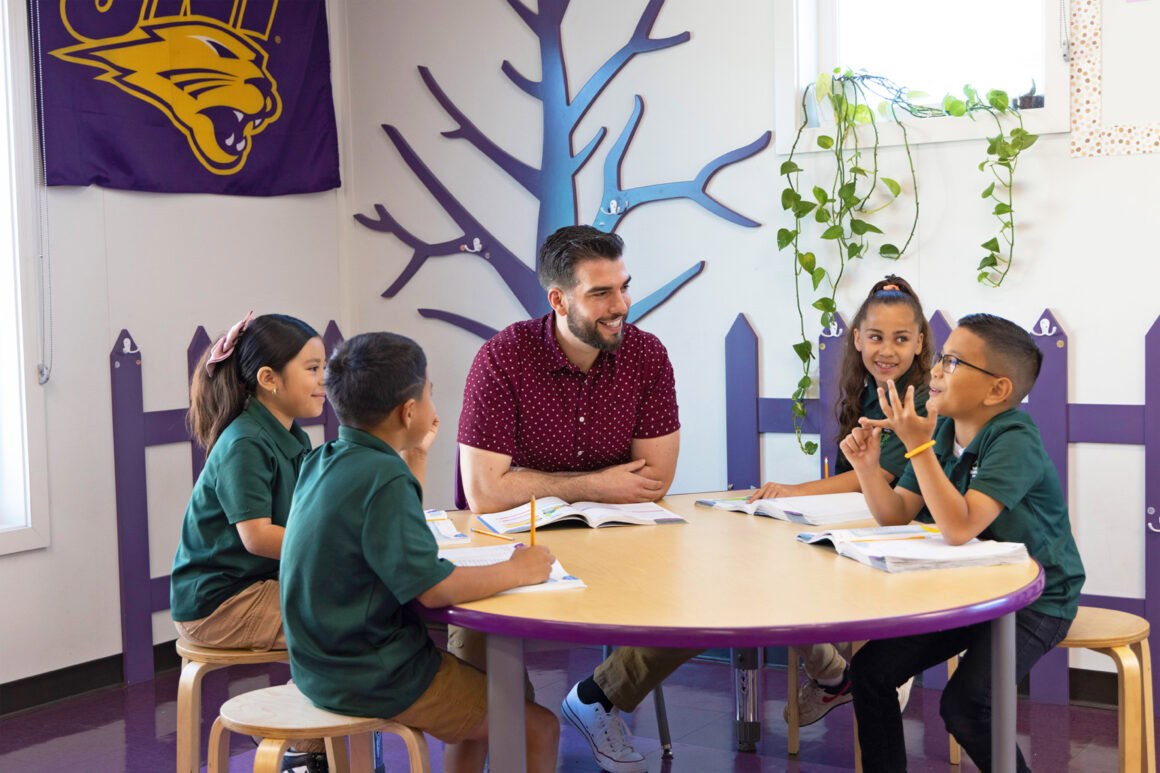
At the Primary School we visited the robotics lab. Here in Central Valley, the L.E.G.O. Wolves Robotics Team – part of the same national program we had seen at the A.J. Whittenberg Elementary School of Engineering in Greenville SC back in 2014 — had made astounding progress in a few years.
The team began in 2019 with 10 scholars. The coach, Ivan Ceballos Madrigal, admitted, “We didn’t know exactly what we were doing,” but managed to qualify for championships in Fresno. The pandemic brought a hiatus in 2020, but the team came roaring back in 2021 and 2022, winning the champions award, qualifying them for the World Festival in Houston. Then on to Florida the following year for an international competition, competing with high school-level schools, where they won 3rd place in the “Motivation Award”. Ceballos Madrigal offered rather shyly, “I got the coach award.”
This past June, the Wolves joined 100 worldwide teams at the Worcester Polytechnic Institute’s (WPI) WAFFLE L.E.G.O. league event in Massachusetts. The coach said that this year’s trip “was more than a competition; it was an inspiring educational journey” that introduced the students to the likes of Harvard and MIT, and to the history of Boston.
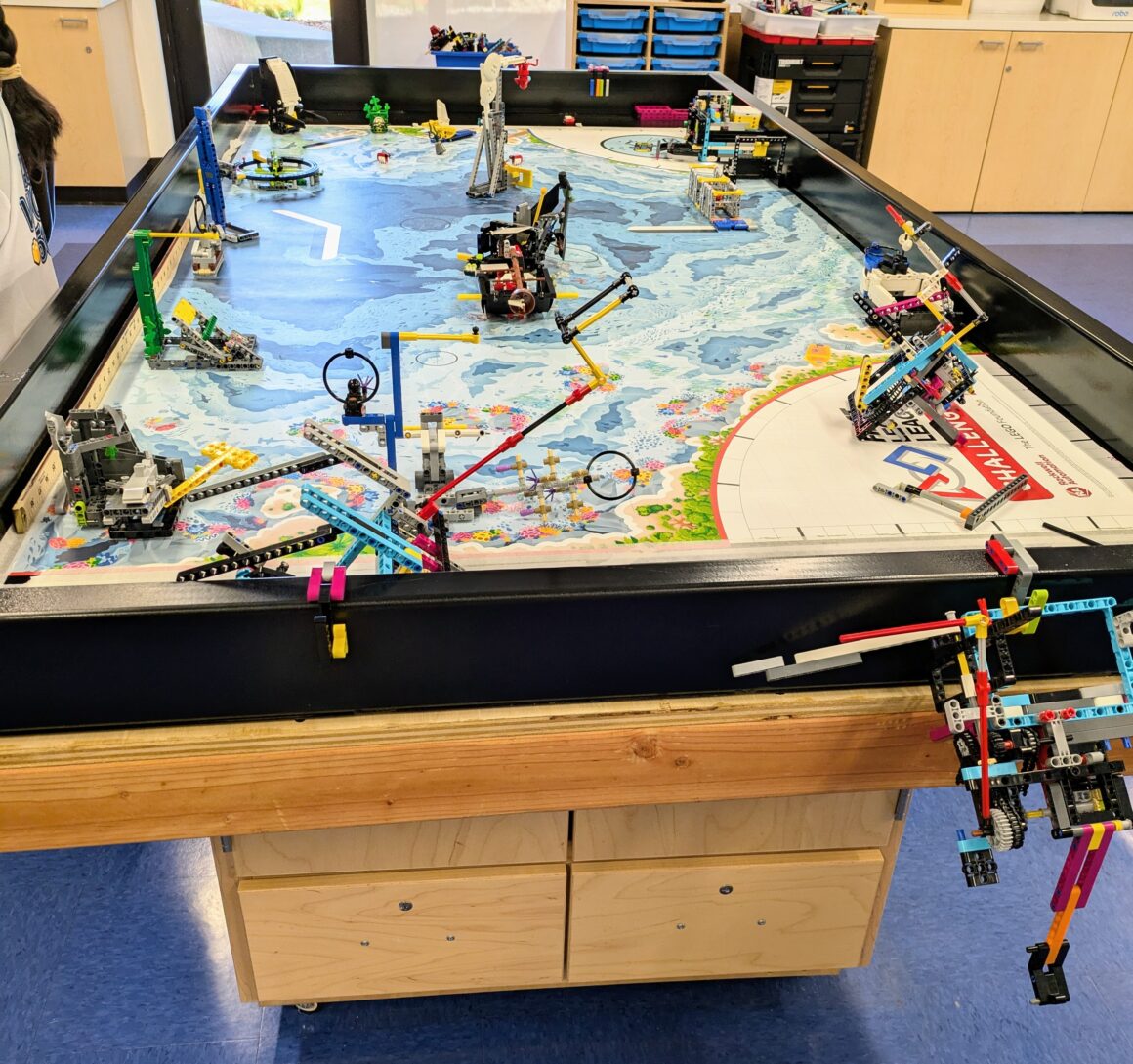
The theme of this year’s challenge was the communications problems that underwater explorers face. Delano’s location in the semi-arid Central Valley didn’t seem to faze the students, as they imagined their way through to helping scuba divers with underwater communications. For their prep, the students interviewed experts from NOAA on underwater noise pollution, and a dive officer at the Monterey Bay Aquarium. They were seeking a solution beyond using hand signals and flashlights.
They created a project they named “Light Show”. One of the students recited, by heart, a detailed, sophisticated description of their project.
“We created light show, a simple, cost effective light system, which uses four color-coded lights to display key messages. For example, red for danger, green for proceed, and yellow for caution, and blue for attention. We also incorporated underwater LED boards. These LED boards display preprogram text messages, ensuring for visibility and safety, making sure that everything is okay, and using words, too. With our innovation, divers don’t have to rely on outdated, unreliable methods. We believe the light show can help underwater explorers communicate underwater making dives safer and more efficient.”
The robotics success was an all-hands effort. The students worked after school, on Saturdays, and during school vacations. They were supported by older students from the original class of L.E.G.O. Robotics, and the administrators and coaches. Robotics was one example of many we saw at WCPA where students relied on each other. In this case the older kids helped younger ones, building a strong community atmosphere.
The school has added on grade levels over the years, and this year was the second graduating class. The school year was drawing to a close when we visited, so naturally the seniors were buzzing about their upcoming plans. They were headed to the UC campuses at Berkeley, Irvine, Davis, and UCLA, and Cal State Fresno, and more.
College talk begins really early at WCPA, with even elementary classrooms adopting a college, and hanging its pennant, learning about school colors, mascots, and songs. In city or suburban schools, where we often hear that so much college talk makes kids anxious and nervous, it serves a different purpose and gets a different reception at WCPA in the Central Valley. Children, so many of them first-gen college aspirants, and their parents grow comfortable with the idea and accessibility of college, demonstrating that college is within reach and meant for children like them.
It’s more than just talk. Many of the older students told us about the college level courses they had taken at WCPA as part of the school’s Pathways program, and how they appreciated the different style of teaching and demands of coursework. Professors from nearby Bakersfield College teach Pathway classes at WCPA; 100% of students take some of their courses, and 50% earn enough credits for an Associates degree by the time they graduate. This is a huge jumpstart in time and money toward a BA, which means a lot to large numbers of students and their families.
One by one, the older students walked-and-talked with us as we toured the campus. Here are some of the highlights we saw and heard about:
Soldiers of Change: The school sponsors a shark-tank like program for projects addressing social change. The students organize themselves into small groups, survey the other students for ideas, collect topics, and make their pitches. Judges listen, award winners, and approve budgets. A recent winner used food (always a hit). Their project was to present new cuisines as intros to new cultures, in the school cafeteria. One boy raved about Indian food, and his first-ever bites.
Drone soccer: WCPA does not field teams in some traditional sports, like football, a fact that discourages enrollment from some boys aspiring to sports with deep footholds in this Central Valley culture.
But into that gap come some creative alternatives. We watched the boys’ drone soccer team, learning to position and execute their individual drones as team players. They’re “starting to figure it out,” we heard about this very new team.

Besides baseball, basketball, soccer, etc., there are yoga, weight training, and fitness classes, in a gym where kids are encouraged to set up their own workouts and practice.
Mariachi: What marching bands are in midwestern high schools, mariachi bands at WCPA’s Mariachi Lobos program is in the Central Valley.
Learning Farm and Harvest Hall: At the school’s on-site garden, called the Learning Farm, students learn to grow and harvest crops. The results show up frequently in the school cafeteria, to the delight of the young farmers. One of our guides reported an overheard conversation, “Hey, those are my tomatoes you’re eating. I’ve been growing those and now they’re on your flatbread! Check out my tomatoes!”

The cafeteria, called Harvest Hall, is the center and culmination of the food programs at WCPA. Students and staff are provided 3 free meals, as well as fruit and nut snacks to grab throughout the day. Special monthly food themes might feature Cinco de Mayo or Earth Day. In fact, every day looks like a celebration at Harvest Hall, with multiple food stations of different cuisines, and the regular staples of Latin food and salad bars.
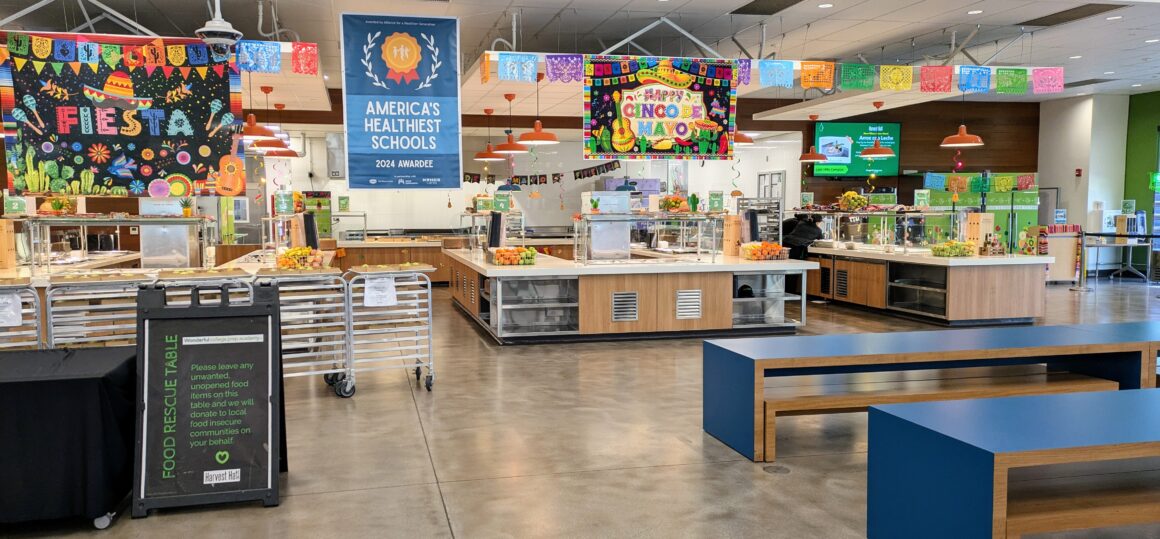
Beginning in 7th grade, in the classrooms and kitchen, students learn how to build and cook meals, and even take home ideas to their families. On any given day, high schoolers may be prepping the food, serving the meals, doing the checkout. Besides imparting these practical, lifelong skills, there is a higher purpose for the emphasis on nutritious food. Here in the Central Valley, which provides about 25 % of America’s food supply, WCPA is developing and nurturing a sophisticated sense of the ecosystem of agriculture, nutrition, and business. But also, here in Kern County, home to both Lost Hills and Delano, the rate of obesity is 49% and of diabetes, nearly 9%. So, WCPAs are starting early to build good foundations and break bad cycles. The adults emphasized to us that they’re “stamping” the kids with an understanding and experience in managing every aspect of this place-based asset of the food culture that surrounds them. “That’s a piece that we see as vital.”
Wellness center: The on-site school clinic, a School Based Health Center (SBHC), offers free wrap-around services to all students, from annual visits to counseling, immunizations, and the inevitable minor scrapes and coughs, and a fully-stocked dispensary for common formularies. At the Lost Hills campus, the services are extended to families as well. SBHCs are frequently located in areas where access to regular health services can be hard for socioeconomic or geographic reasons. The staff reports that at the WCPAs, the centers keep life rolling along more smoothly for families, providing medical care without parents having to skip work and take kids out of school. And all for free.
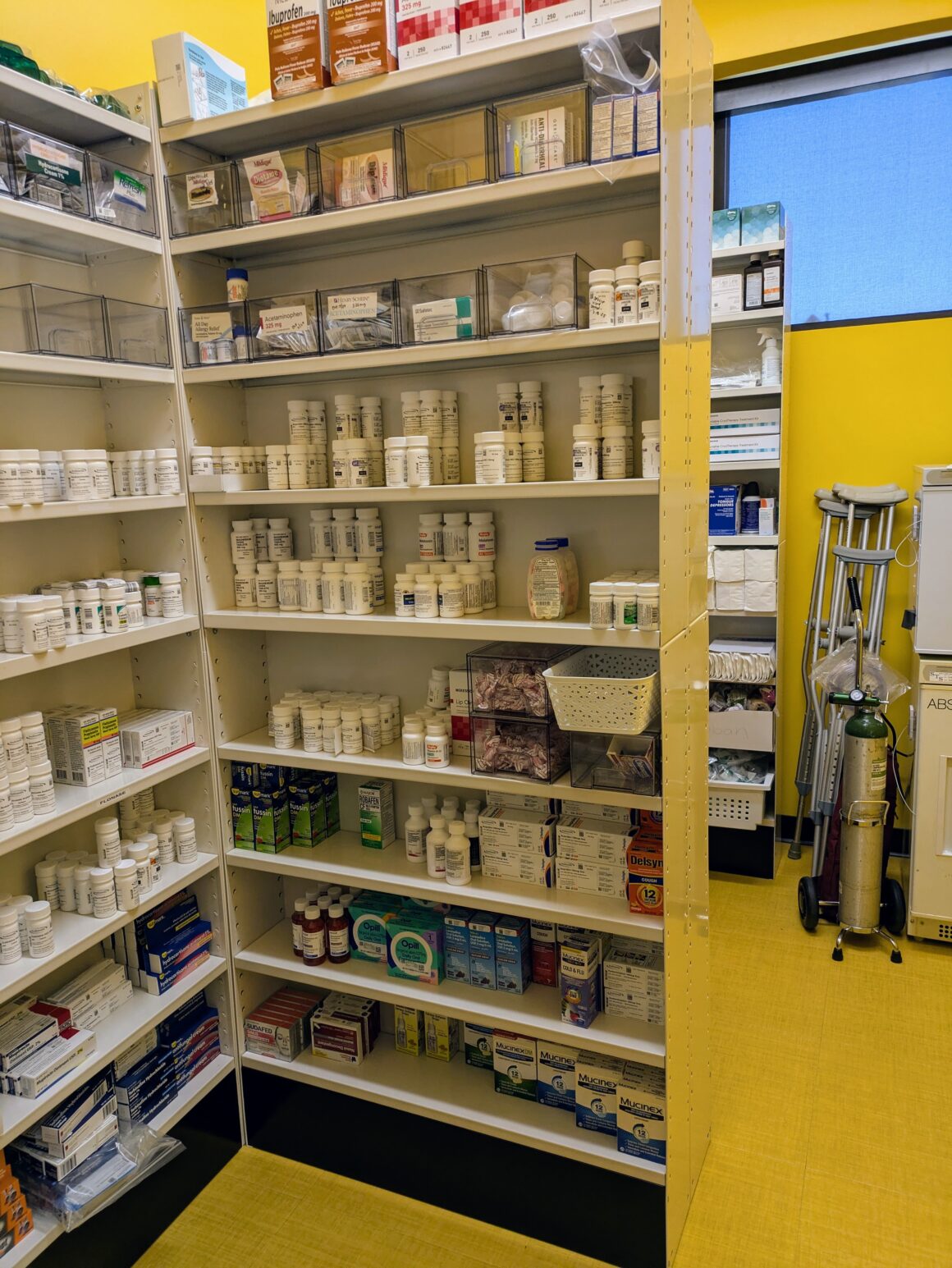
Transportation: In the Golden Triangle of Mississippi, the East Mississippi Community College prepares students with technical skills to match new industry in the area Raj Shaunuck, a vice president there, articulated to us something we heard in many rural or poor communities, “Many of the students are just one flat tire away from losing their job, or not finishing their education.” In the Central Valley, such vulnerabilities also include transportation. That is why it is critical that WCPAs offer free bus transportation for their students.
Next up in our series about the Central Valley, we’ll go to Fresno State, where many WCPA students enroll, to learn about the school, how the WCPA students’ experiences play out, and the support extended by the Wonderful Company to help them succeed in their next steps.


